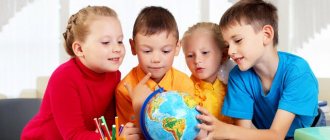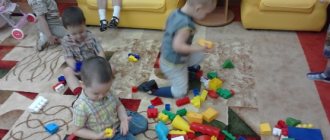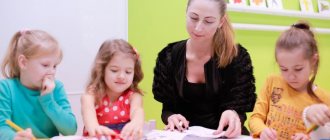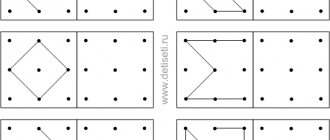MAGAZINE Preschooler.RF
Preparing children for school, taking into account the requirements of the Federal State Educational Standard for preschool education and primary general educationIn the Law “On Education in the Russian Federation”, the main principle of state policy in the field of education is ensuring the human right to education throughout life, i.e. continuing education (Art. 3, Art. 10).
In the Russian Federation it is now legally established that preschool education is the first stage of education in general and should be publicly accessible and free.
Continuity is the connection between phenomena in the process of development, when the new, removing the old, retains some of its elements (TSB); involves not only the elimination of the old, but the preservation and further development of that progressive, rational that was achieved at the previous stages, without which movement forward is impossible; in society means the transmission and assimilation of social and cultural values from generation to generation.
Educational standards as the basis of continuity. The Law “On Education in the Russian Federation” states that educational programs of preschool, primary general, basic general and secondary general education are successive (Article 63). Continuity is ensured, first of all, by federal state educational standards.
Federal State Educational Standard is a set of requirements mandatory for the implementation of basic educational programs of preschool, primary general, basic general, and secondary general education.
The standards of preschool education and non-education education determine the purpose of education at each level.
A child is first included in the education system by entering kindergarten, and then for the first time comes to a new educational level - primary school. It is at this transitional moment a “safety cushion” .
The kindergarten should become the foundation, and the school the building.
The Federal State Educational Standards for Additional Education and the Federal State Educational Standards for Non-Educational Education are based on a single theoretical basis:
- system-activity approach, which involves the education and development of personality traits, the formation of readiness for self-development and continuous education;
- active cognitive activity of children;
- construction of the educational process taking into account the individual age, psychological and physiological characteristics of students.
The main purpose of the Federal State Educational Standards for Additional Education and the Federal State Educational Standards for Non-Educational Education is the formulation and provision of a system of interrelated requirements established at the federal level:
- to the structure,
- conditions and
- results of the implementation of basic educational programs.
First of all, you should pay attention to the analysis of continuity in the methodology and structure of the Federal State Educational Standards for Additional Education and the Federal State Educational Standards for Non-Educational Education and the analysis of the requirements for the structure of the educational program.
Comparative analysis of the content areas of the educational programs of the Federal State Educational Standard of Education and the Federal State Educational Standard of Education
If we pay attention to the substantive aspects of the project of the Federal State Educational Standard for preschool education and the Federal State Educational Standard for primary general education, we will be convinced of the existence of continuity between the areas at the preschool level and at the primary school level.
The five educational areas outlined in the draft Federal State Educational Standard for preschool education have a direct projection onto the subjects of the main educational program of primary general education.
The results of mastering general education preschool education are formulated as targets and are not subject to direct assessment and are not the basis for comparison with the actual results of children.
Results of mastering OOP NOO:
- personal (not subject to individual personalized assessment,
- meta-subject (universal learning activities) and
- subject results (subject to intermediate and final individual assessment).
The Federal State Educational Standard for Preschool Education tells us that the main task of a kindergarten is to form in children the prerequisites for universal educational activities. This is the essence of continuity between preschool and primary general education.
What is UUD?
Universal learning activities (ULA) are a set of student action methods (as well as associated learning skills) that ensure independent acquisition of new knowledge and the formation of skills, including the organization of this process.
UUD functions:
- ensuring the student’s ability to independently carry out learning activities, set educational goals, seek and use the necessary means and ways to achieve them, monitor and evaluate the process and results of the activity;
- creating conditions for the harmonious development of the individual and his self-realization based on readiness for lifelong education;
- ensuring the successful acquisition of knowledge, the formation of skills, abilities and competencies in any subject area.
UUD groups:
- personal,
- regulatory,
- communicative,
- educational.
Currently, the problem of continuity is that instead of the prerequisites for educational activity in preschoolers, they are trying to form its elements.
Components of educational activities:
- motives;
- learning goal;
- learning task;
- training activities and operations.
There are two approaches to the problem of continuity at the stage “preschool age - primary school age” .
The first approach relies on tactics of accelerating the pace of child development. It consists of a simple and direct adjustment of the socio-pedagogical priorities of a preschool institution to the requirements and characteristics of school education.
The second approach is based on the tactics of further development in elementary school of those elementary learning skills with which a child comes from kindergarten. However, neither one nor the other approach provides a satisfactory solution to this problem. As a result, a contradictory and even paradoxical picture is observed. On the one hand, in kindergarten, accelerated preparation for school actually displaces specific forms of active activity of a preschool child (from play to various types of artistic creativity). They either give way to “learning in the classroom” , or they themselves change significantly ( “didactized” , in the fair expression of V.T. Kudryavtsev) - the features of educational subjects begin to visibly appear in their content.
The Federal State Educational Standard for Educational Education aims us to abandon the knowledge paradigm in education: not ZUN, but the formation of learning skills.
Mastering the Program at a preschool educational institution is not accompanied by intermediate certifications and final certification of students.
The main objectives of cooperation between preschool educational institutions and schools are:
- establishing unity of aspirations and views on the educational process between kindergarten, family and school;
- development of common goals and educational objectives, ways to achieve the intended results;
- creating conditions for favorable interaction between all participants in the educational process - educators, teachers, children and parents;
- comprehensive psychological and pedagogical education of parents;
- providing psychological assistance in understanding one’s own family and social resources that help overcome problems when a child enters school;
- formation in families of a positive attitude towards the active public and social activities of children.
It is very important that the continuity of preschool and primary education is carried out in accordance with the ideas that are reflected in the Federal State Educational Standard for preschool and primary general education.
It is advisable to carry out work on the continuity of the kindergarten with the school in three main areas:
- methodological work with teachers (familiarization with the requirements of the Federal State Educational Standard for a graduate, discussion of the criteria for a “portrait of a graduate” , searching for ways to resolve them, studying and sharing educational technologies used by preschool and school teachers, etc.);
- working with children (introducing children to school, teachers, organizing joint events);
- work with parents (obtaining information necessary to prepare children for school, advising parents on the timely development of children for successful schooling).
To sum up the comparative analysis of the Federal State Educational Standards for Educational Education and the Federal State Educational Standards for Non-Educational Education, we can say that both of these documents are closely related to each other. A start has been made to ensure the continuity of educational programs of preschool educational institutions with exemplary educational institutions of non-profit educational institutions. Duplication of program areas of knowledge is eliminated, and the implementation of a single line of general development of the child at the stages of preschool and school childhood is ensured.
This approach to implementing a single line of child development at the stages of preschool and primary school education can give the pedagogical process a holistic, consistent and promising character. And finally, the two stages of education will not operate in isolation from each other, but in close interconnection, which will allow the school to build on the child’s development received in a preschool institution.
| Next > |








